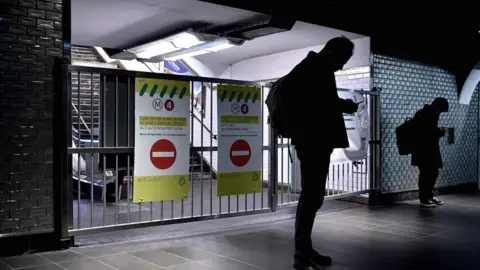France protest: Mass rallies held on sixth day of disruption
 Reuters
ReutersFrance is experiencing another day of disruption and protests over major changes to the pension system planned by the government.
Mass union-called demonstrations have been held on Tuesday - the sixth straight day of action.
Public transport in Paris has been badly affected and workers have also blockaded several oil refineries.
The government is to set out full details of the pension changes on Wednesday.
Prime Minister Edouard Philippe told party colleagues his speech would have no "magic announcements" to bring the demonstrations to a halt.
Protests took place in several cities as unions sought to maintain the intensity of last Thursday's first day of demonstrations. In central Paris, union officials estimated that 180,000 had turned out, although this is down on the estimate of 250,000 on 5 December.
Public transport and hospitals have been affected by the action. A number of secondary schools and universities were shut for the day in Paris, Lille, Lyon and Bordeaux.
 AFP
AFPHospital interns in the capital said they were planning walkouts to highlight "degraded care" where they work.
Just one in five high-speed TGV trains were running, and Air France cut 25% of domestic flights scheduled for Tuesday and 10% of its shorter international flights, AFP news agency reports. Three out of five Eurostar trains were running, the SNCF rail operator said.
At 08:00 (07:00 GMT), there were 400km (250 miles) of traffic jams in the Paris region, reports say.
Transport in Paris was heavily disrupted, with metro lines either closed or running a very limited service. Half of the city's tramways and buses were predicted to be operational.
Some Paris museums were again forced to partially close, and both opera houses again cancelled performances, AFP says.
"Psychologically it's stressful because you don't know if you're going to get where you need to," commuter Benit Ntende told AFP as he waited for a train at Saint-Lazare station in Paris.
"You have to wake up earlier - it's one of the joys of life in Paris."
Workers are angry about the prospect of retiring later or facing reduced payouts.
"Yes there is a need to reform the pension system, there's no need to break it. What [President] Emmanuel Macron is proposing is to break it," Philippe Martinez, the leader of one of France's biggest unions, CGT, told French TV.
"Either it's solidarity, or it's each to his own," he said.
France currently has 42 different pension schemes across its private and public sectors, with variations in retirement age and benefits. Mr Macron says his plans for a universal points-based system would be fairer, but many disagree.
The strike over his pension plan has drawn people from a wide range of professions, including firefighters, doctors and transport workers. Some have vowed not to stop until he abandons his campaign promise to overhaul the retirement system.
Difficult reform
The Macron administration will hope to avoid a repeat of the country's general strike over pension reforms in 1995, which crippled the transport system for three weeks and drew massive popular support, forcing a government climbdown.
Mr Macron's unified system would reward employees for each day worked, awarding points that would later be transferred into future pension benefits.
The official retirement age has been raised in the past decade from 60 to 62, but remains one of the lowest among the OECD group of rich nations - in the UK, for example, the retirement age for state pensions is 66 and is due to rise to at least 67.
The move would remove the most advantageous pensions for a number of jobs, and unions fear the new system will mean some will have to work longer for a lower pension.
Failure to reform would mean a deficit of up to €17bn (£14bn), 0.7% of GDP, by 2025, an independent pension committee forecast quoted by Reuters news agency says.
The government would have a very tough task in explaining its plans, the prime minister was quoted as saying, as people would not believe the administration's messages if the pension reforms were not carried out.
